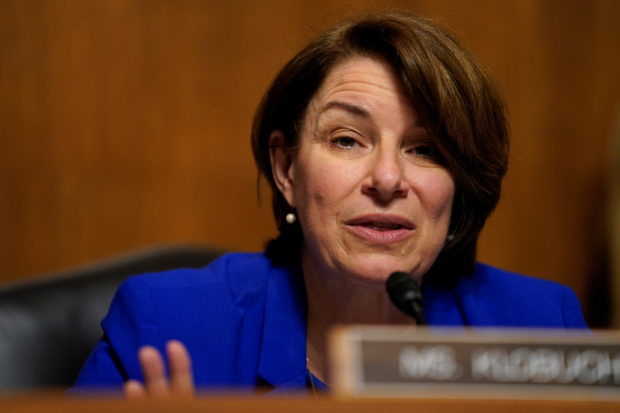US senators urge funds to help election workers amid ‘unacceptable’ threats

FILE PHOTO: U.S. Senator Amy Klobuchar (D-MN), chair of the Senate Judiciary Subcommittee on Competition Policy, Antitrust, and Consumer Rights, speaks during a hearing on “Big Data, Big Questions: Implications for Competition and Consumers” in Washington, D.C., U.S., September 21, 2021. Ting Shen/Pool via REUTERS
WASHINGTON — The leaders of a Senate committee on Monday urged the Federal Election Assistance Commission to help election officials around the country tap federal money to strengthen security during a wave of threats and harassment following the 2020 U.S. election.
“This onslaught of threats against election workers is unacceptable and raises serious concerns about the ability to recruit and retain election workers needed to administer future elections,” the Rules Committee’s Democratic chairwoman, Senator Amy Klobuchar, and top Republican, Senator Roy Blunt, said in a letter to the U.S. agency overseeing election administration.
The senators asked the agency to provide state and local election officials with information on how to use federal election funds to improve security. They also asked it to provide guidance on other resources available “for identifying and responding to potential threats.”
The letter follows a series of Reuters stories documenting a campaign of fear waged against frontline election administrators inspired by former President Donald Trump’s relentless false claims that the 2020 vote was “rigged” against him. Reuters has documented nearly 800 intimidating messages to election officials in 12 states, including more than 100 that could warrant prosecution, according to legal experts.
“Reuters’ ongoing reporting on this issue has helped expose the extent and nature of threats against election workers and officials,” a Rules Committee staffer said.
Article continues after this advertisementThe independent, bipartisan agency was created under a law passed by Congress in 2002 to help states modernize elections after problems during the 2000 presidential vote. The agency distributes federal funds to help states run elections, provides guidance on federal election law and certifies voting machines.
Article continues after this advertisement“We must ensure that election workers are able to do their jobs free from threats, intimidation or other improper influence,” the committee leaders said in the letter.
The senators said the committee has heard from state and local election officials seeking guidance on how to use federal funds to help with costs such as hiring security after being targeted by threats or employing firms to investigate threats on social media and share that information with law enforcement.
An agency spokesperson did not immediately respond to a request for comment.